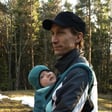Become a Creator today!Start creating today - Share your story with the world!
Start for free
00:00:00
00:00:01

#86 Kira McLean
We are back from long summer break with Kira McLean, clojurian and working on Clojure Data Cookbook.
Follow her on for updates and check out the data cook cookbook https://github.com/scicloj/clojure-data-cookbook
Transcript
Podcast Comeback & New Guests
00:00:17
Speaker
I think we should start because it's where I think the gremlins are all out. Yeah. Yeah. Yeah. I think we should give something for water to let's get started. Let's get started. So I think I lost the what do you call? I mean, it's been so long because we took a long sabbatical, you know, given that, um,
00:00:40
Speaker
I'm looking forward to what the reason is that you're going to give now. I don't know what it is, but I'm kind of like, in real time, invent something. I was about to say, you know, closure isn't done language, so the podcast is done. That was my intention almost. So the podcast is basically tracking the
00:01:04
Speaker
the minds of rich and the like, you know, the, I don't know, the elders of closure. And then it's like, yeah, fuck, I didn't think we were done, I guess. And then, but then we keep finding new, awesome people to talk to. So we had to come back. It's like, you know,
Weather & Cultural Banter
00:01:20
Speaker
all the, imagine that I was sitting in like a Sylvester Stallone somewhere and there is a huge helicopter coming in and saying,
00:01:27
Speaker
We need you back. One last podcast. One last podcast. So they had to coast me back in and then. Oh my gosh. And Ray, and just imagine that in a museum somewhere, trying to code enclosure in a hut somewhere. And then there is a huge helicopter hovering around. You need to come back and tell the people. I have something to say. Wait.
00:01:58
Speaker
Anyway, no, I think we just got a bit complacent and lazy and also given that the world is doing so good. So we were enjoying fun. It's just outliving my sweet life. Exactly. Two wrapped up in the beautiful life. So I think it's time to every now and then come
00:02:20
Speaker
How do they all come to the surface and breathe all the crap that is happening out there? Another way of looking at it, Vijay, is that with global warming, the summers went on for so, so long. Yeah, exactly. This is the end of our official summer break now, you know. That's true. Yeah, it's true. It's actually, it's like 20 degrees Celsius. You guys, yeah, you're not neither of you in America. Yeah, we're not mental. We use proper. We're not barbarians.
00:02:48
Speaker
Yeah, it's, uh, there was entire US audience. All
Political Jokes & New Guest Introduction
00:02:56
Speaker
the Americans just turned off the podcast. Yeah. I think that's kind of a long time ago with all the fucking. It's true. Yeah. Sorry. Yeah. It's a, I was going to say it's been like 20 degrees here today, which is like, we're crazy uncharacteristically warm for this time of year. Yeah. Yeah. So yeah.
00:03:15
Speaker
Anyway, let's start on that happy note then. So it's still nice summer weather in Canada, apparently. We're getting this little bonus wave, yeah. Exactly. The Indian submarine. That's, you know, the Indian podcast, you know, so it's pretty good. I don't think you will experience Indian summer, you know, 40 degrees, mosquitoes everywhere. I don't know if I can handle it. Sorry, Indians. But they're all turning off now.
00:03:46
Speaker
We've built up such a good reputation with a diaspora, but we're fucked again. I think it's almost like a bingo card. We have like every country, every possible
00:03:58
Speaker
in a group of people that we can offend. And then we keep checking them like, Oh, did we offend them? No, not yet. Okay. We'll get to them, I guess. Actually, there has been some good news. We were talking about politics beforehand, but like, seeing the back of Bolsonaro has got to be good for everyone. So well done, the Brazilians. Fuck you, the Brazilians who voted for him, but you know, they can fuck up anywhere. You know, they're not listening to closure. I hope not. You know, I'm sure. Yeah.
00:04:26
Speaker
We never know. We might be super popular in the right-wingy, you know, new bank is Brazilian, right? Yeah. New bank is Brazilian, but they're all closure. So that's good. I bet there's a sizable closure Brazilian cohort. I think so. Definitely. Yeah.
00:04:47
Speaker
Anyway, let's do a proper introduction. Welcome back to DeafN. I know I think lots of people are missing us, at least two of you. So welcome back. So we are back with all the way from Canada.
00:05:03
Speaker
Kira on the podcast that have been, I don't know, people already noticed and then know already who it is because we usually put the name in the title of the podcast. So it's not that secret
Kira's Journey into Clojure & Small Team Dynamics
00:05:12
Speaker
anymore that you're on the show. So welcome to the show Kira. Maybe it's a good time to introduce yourself and tell us
00:05:21
Speaker
Why are we here? Well, that's a great question. I don't actually know all of a sudden I seem to have stumbled into this world of closure developers. But yeah, no, thanks for having me. My name is Kira, I guess, as you mentioned. I write software for a living.
00:05:42
Speaker
I guess we connected a little while ago, but in the recent months, I've taken on a couple of projects in the data world of Clojure, the sort of
00:05:56
Speaker
I don't know if that's the best way to describe it, but yeah, a couple of projects related to trying to build some educational resources for people using data, or sorry, using Clojure to work with data. So I am mostly a web developer and kind of stumbled into this whole world. I even, I stumbled into Clojure in the first place, so I was doing the Ruby JavaScript
00:06:20
Speaker
kind of more classic web developer thing for some years and then just kind of happened to find this job with a team of UK based developers building open data publishing tools for several agencies over there. The company was called Swirl and has recently been acquired by TPX Impact. But anyway, I've been contracting with them for several years now and
00:06:46
Speaker
Yeah. So mostly I do web development stuff in my day job, but we work with a lot of data and we help a lot of agencies kind of curate and publish their data. And so that's what kind of...
00:06:59
Speaker
got me into that world. So what was the first touch point? I mean, is it something before you joined this company or did you already know about Closure? For Closure? No. So I had never really worked with our
00:07:19
Speaker
even heard much about closure before I joined this team. But, um, yeah, I tend to search for jobs based on like the team and the work, like the type of work more than the language, although that's probably changed. I don't know if I would go back to any other language besides closure now, but at the time, like before,
00:07:40
Speaker
Yeah, closure, I'm quoting software. But yeah, before this job, I had learned like a new language for every job. So it was normal to me to just not really care about the stack and focus more on like, what the company was doing, basically, and like what the kind of work was. And so
00:07:57
Speaker
Yeah, so I was like whatever I'll try it out I'll see how closure goes and we did like a couple months like kind of trial run like understanding on both sides like if this doesn't work out You know if I hate closure if I can't learn it like I'm they're free to let me go or I was free to leave so But yeah, so yeah, no it worked out. It's an interesting moral dilemma
Work Culture Across Borders & Capitalist Critique
00:08:17
Speaker
though if you say okay I'm only going to work in closure and then you say oh, please join our tobacco company
00:08:22
Speaker
It's true, yeah. Are you going to say, no, you guys should use C, C++, and Scala, and then just... Yeah, but remember, tobacco companies are also making these like breather machines now to help people with asthma. Oh my gosh. They're good. They're on the good side now. They're on the healthcare base now. Exactly.
00:08:43
Speaker
Yeah, I don't know if I would, I don't know. I don't like to think about getting another job. Like this is the first job I've ever had that's like...
00:08:55
Speaker
I don't want to disparage my previous jobs, but yeah, I was going to say good. This is the first team I've ever hit, right? I don't want to just constantly quit all the time because I hate it so much. There are good days and bad days, obviously, but for the most part, I definitely am secretly hoping this is my last job I need to have in software and after I'll figure something else out. So I don't know.
00:09:17
Speaker
But you look like you're about 15, Keira. Thank you. I'm a few years away from retirement. I'm not too sure what the plan is. Closure makes you retire either super rich
00:09:36
Speaker
or disillusioned about software and then just quit it. Either way, you're going to retire early, big views closure. From software, anyway. I don't know how many more years of software development I have in me. But that's part of why I'm excited about this. So one of the projects I mentioned is this closure data cookbook. So in some ways, I see this as I'm trying to wrap up my time in software. I want to get everything out of my brain.
00:10:02
Speaker
make some resources, try to publish some helpful guides. Wait, I thought this episode was people coming to me and then bringing back into closure. I didn't know that this is turning into like, we are going to Kira and then telling her like, no, there is one more job that you need to do. Yes.
00:10:22
Speaker
You got to do this pretty quick. No, I'm definitely several years away from retiring. It's not a realistic thing, but I find the industry in general pretty depressing. You can find your people. You can always find the small teams and the right kinds of people to work with, but just the idea of working
00:10:45
Speaker
for like the big tech companies is totally uninteresting to me. And I know there's lots of other people who have needs like, you know, who would hire a software developer. I mean, that's how I built my whole career working with small teams. But the problem is small teams always become big teams. So far, every job I've had, I started on a team with like two or three or maybe 10 people and then inevitably over the course of two or three or four years.
00:11:08
Speaker
They either get acquired by a big company and you become part of a thousand person engineering team or they want to blitz scale. And so they take VC money, which just invariably destroys the company. And it's like,
Myths of Success & Stock Options Skepticism
00:11:21
Speaker
I've never been in a job longer than I say, three years before something like that happened. Like they either, uh,
00:11:30
Speaker
Basically, you get acquired. If you take VC money, you've been acquired by them. And the whole purpose of the company becomes generating revenue for the VC, which just sucks. Or eyeballs or whatever. Yeah, exactly. But you say you're working for government agencies now. There's a whole sector of the economy, government, charities, NGOs, all these kinds of things.
00:11:51
Speaker
And all of these, you know, softwares everywhere now. So a lot of these people, you know, it's not just like banks, tobacco companies in the military that need it. Thank fuck. Yeah, no, for sure. And that's very true. Like I was saying, I do think like I am, I find some of the work that we do with Swirl or I guess TPX now.
00:12:10
Speaker
Um, yeah, like pretty interesting and it's and that's the thing it's you know, maybe it's not it's not as glamorous as like saving the world or whatever, but it's i'm pretty confident it's not like actively destroying society like
00:12:22
Speaker
I mean, if you squint long enough, like the Silicon Valley, you know, series, like everybody's saving the world. Yeah. Well, that's the thing. Well, that's the thing I used to work with American companies. And I just like honestly couldn't handle it anymore. This like the Silicon Valley, like, oh, we're saving the world with our Airbnb ripoff or like our Uber for cats. Like it's just absurd.
00:12:47
Speaker
I thought for a second there you actually had like a handle on a company that really was saving the world, you know, and it was like, who are these people?
00:12:58
Speaker
Right? Yeah. No, I've tried. I've definitely like, I would say from pretty early on, like tried to at least, um, yeah, I've, I've made what I at least count as an attempt to like, you know, search, seek out those kinds of companies, like ones that are doing work for nonprofits or like, or our nonprofit themselves, or, you know, basically like all companies that have this impact
00:13:23
Speaker
stuff on their radar and honestly like it's better than nothing like even the companies that Yeah, I guess the problem is like it just makes me even more disillusioned because once you see how the sausage is made a little bit You're like, oh boy, like this is I don't think we're doing as much good as we say we're doing right in it and then kind of like the impact thing becomes just a way to get more VC dollars or just another marketing thing and it's like
00:13:50
Speaker
Well, that's not why I'm doing it. Ultimately, the problem is the thing I hate about software is most of the jobs, at the end of the day, the purpose of your job is to just make some rich guy richer. You're not actually really doing anything, and almost all of the fruits of your labors are just like, don't get me wrong, software engineers are paid very well, and I don't think
00:14:13
Speaker
I'm unfairly compensated or something. And I think this is arguably different in my current role, but when I was working for American startups, it's just like, what is the point of my life? All I do all day is write codes that this rich asshole can get even richer. I don't care about that. You were funded by Peter Taylor, were you?
00:14:38
Speaker
Not him specifically, although yeah, I interviewed a couple of companies and like they say that as if it's like a good thing. We're funded by a Peter Seals VC and it's like, wow, I'm out. I'm so out. I could not be more out. I would rather work for a tobacco company. I really would, honestly. I know it's complicated. I know there's like companies can do good things with dirty money or whatever, but it's just like,
00:15:08
Speaker
Yeah, I don't know. But American work culture really sucks too. It's just awkward working with people who never take vacation and work long hours. I think it's normal. I think I probably can only ever work with Europeans. This UK-based team has really spoiled me. What about the Canadians? Are the Canadians a bit more relaxed in that? They take their four, five weeks, six weeks holidays.
00:15:33
Speaker
I would say so. It's hard to say. So my most of my experience when I was working in offices was in Montreal, in Quebec, which is like
00:15:42
Speaker
for sure the most like culturally similar place to Europe. So it's a little bit more of like a French kind of culture. So yeah, it was pretty normal to like stroll into the office at 10 or 11 in the morning and like, take a, yeah, take a nice long lunch, like take two weeks vacation and actually just totally ignore your work stuff and not be on Slack the whole time. And like,
00:16:05
Speaker
Yeah. I think it varies. What I like about that seems to be like a normal life to me. It doesn't seem like a luxurious life. That seems like fine. What I like about this, there's this thing called quiet quitting, which we were talking
00:16:19
Speaker
Yeah. Oh yeah. Well, what does it mean? I heard about this. It just means that you're doing like, you're doing nine to five, you know, and you're like taking holidays and you're taking, you're not working at the weekends. And I'm like, no, that's not quite, that's not quite quitting. That is actually doing your job. Yeah. Isn't that just working? That's just working. I know this expectations have gotten out of line for sure. Like,
00:16:45
Speaker
And that's the problem is that like, you know, I think maybe there was an era like 50 years ago where if you like were an early contributor to a startup and you've got like options or whatever, like that might actually pay off for you. But like, there was a good article recently. Well, I say recently, it was probably like last year or something. Anyway, going around about, you know, just like how basically like how shitty options are now, like you they won't you won't ever actually make money. That's the thing. Like if you do the like slaving away for a startup thing,
00:17:14
Speaker
you will never personally see the benefits. You may make the founders rich, but you'll never get rich yourself. And it's like, but I don't know. We still glorify that. I think like less and less so, I think. And I think the tech industry is like, we're lucky that there's, you know, obviously a lot of like really wealthy privileged people who like have the bandwidth to like, and the platforms to speak out against it. But like in general, the some corners. I think that if,
00:17:43
Speaker
I mean, the only one thing I guess I learned something like one thing that I learned from MBA is that cash today is worth way more than cash tomorrow. That's the only thing that I learned. And every time if somebody is telling me that there is a new opportunity, they're going to give you like
00:18:00
Speaker
fifteen percent of the company i
Programming Languages & Societal Parallels
00:18:02
Speaker
said i don't give a shit you know just give me more money now i'm not gonna wait for fifteen years and then whatever that turns into inflation and everything and then i get this is i can already calculate in my stupid excel sheet because of man being like this is this is completely useless in two years so.
00:18:20
Speaker
Yeah, no, exactly. It's going to depreciate like hell. So what is the point? Well, it's the thing. And then by the time they take like 17 more rounds of funding and dilute the shares so much. Yeah, exactly. It's worth nothing. Yeah, but they sell it like they sell it like, oh, we'll pay you 20% less. But if we ever become a billion dollar company, which, you know,
00:18:43
Speaker
I mean, I usually tell them that, you know, give me that money. I'm going to go to the casino right now. Give me the money. Yeah, yeah. Yeah, exactly. Well, that's the thing. I just try to go to the casino and then I check my luck, you know. I don't need to wait for 20 years to see whether this gamble is going to pay off. I can just check it today and then.
00:18:59
Speaker
I know that I'm not that lucky. But I also think it sort of refers to another cultural like, you know, trope, if you like, which is this, you know, if you hard, if you work hard, you will succeed. And I think that is so dishonest. You know, it's such a horrible, horrible kind of trope is that you see, like all the people like my parents worked really hard.
00:19:20
Speaker
And I see a lot of people like nurses, you know, you go to the hospital, like my brother-in-law is a radiotherapist. And I know a lot of people who are doctors and stuff like this, and they work hard. They do work hard. There's a lot of stress. And I think, holy shit, I'm writing software coding up like functions and stuff. It's just not that hard by comparison. But you know, okay, I can do it like intensely from like, you know, six in the morning till like nine at night. So fair enough, you know.
00:19:47
Speaker
I can't, but if I could, that would be working hard. But I also feel like what's really happening with that is that they're blaming victims. If you're not actually the one that's succeeding, it's not because of the system, it's because you didn't work hard enough. You see people who are like teachers, doctors, nurses, working their tits off, and they're not getting paid a lot of money.
00:20:14
Speaker
So it's not because they're not working hard that they don't succeed. It's because they're being completely exploited.
00:20:21
Speaker
I think that's a good point. And it's true. That's the thing. It's even worse outside software. And you're right. It's a broader cultural problem is that we have this totally false cultural narrative. That hard work pays off. But like you said, it just objectively speaking doesn't. For the last 50 years, wages have been totally flat and the cost of everything else has been going up. And people are working more, not less than they used to and getting nowhere. I don't know anyone
00:20:47
Speaker
Like in my generation like there it's very normal now in your 30s to have roommates and very few people own houses and it's just like the future is just very different it's just a very different world right it used to be like students and poor people live with roommates and now that's just the only way to survive and it's like it's uh yeah it's it's not just in the tech industry and i mean i don't know yeah in
00:21:10
Speaker
Like there's lots of problem. Anyway, we don't have to get into all the like details, but like they're like right now it's on strike because like they're like the government refuses to pay them. And now everybody's blaming the teachers because they're like, Oh, you can't believe you don't care about the kids. Like, like you said, like they're working, they're working so hard. I don't know. Like I cannot imagine putting in the amount of effort that teachers put in. They just are constantly working in them.
00:21:37
Speaker
to say that, you know, all of that you just are. And people, they pray, they pray on the sort of vocational aspects of those jobs. Yeah, you know, absolutely. I mean, to me, it's I mean, you know, maybe we'll wrap up this kind of society, society's ills in a minute. But you know, I want to end like what I feel like in the software industry, which is most like, like I would say, it's like the nurses of the software industry are games developers.
00:22:06
Speaker
Because people see games developers who've got this passion to make games. But the studios ruthlessly exploit these people and make them work crunch hours all the time and stuff like that. And I see that. And that really makes me despair about the software industry. Because it's not about working hard. It's about having good ideas and having good organization and being humane.
00:22:34
Speaker
I think that's the awkward thing. Nobody wants to admit that for our entire society to function, our world that we've built depends on exploitation. It just breaks down. If you refuse
00:22:49
Speaker
to, if you insist on treating everybody fairly and ethically and paying everyone, you'd have to make some pretty dramatic changes. Our current systems just don't work without... But they're just organically grown, like writing code in REPL. No, they're just... It's brought it back. It's true, yeah.
00:23:13
Speaker
It's circling back. Because nobody is sitting there and then deciding, well, I'm going to design this with strict static typing. And then now the society is going to follow the static typing. No, that's not how it's called. That's very true. Everything is just a muddy, organic way of resolving things. And that's why we are always in the mediocre level of, which is, I mean, we should praise mediocrity because that's the big thing that we could achieve. But anyway.
00:23:42
Speaker
My point is that is closure more organically grown problematic thing that you got into from web development? Oh, he's brought it back. He's brought it right back. He's brought it right back. Circling back to closure. So yeah, I guess in terms of my journey. Pulling you out of the nosedive of your career ending. Yeah, yeah, yeah. So speaking of quitting software forever,
00:24:11
Speaker
Yeah, no, I would say I'd more like one last job. Yeah. I think this is becoming more of a therapy podcast than a sort of talk me off the cliff. Before you go back to Ruby.
00:24:29
Speaker
Exactly. No, I definitely won't be going back to Ruby, but yeah. No, I definitely, I love working with Clojure, but yeah, I think I kind of just lucked out. I kind of like stumbled into this job. But I'm curious given your, so you said you were doing web development with, I'm guessing Ruby front-end tech and everything.
00:24:47
Speaker
And then you find the team that you want to work with, and then you try to learn the new language. And I think one of the biggest things that we keep hearing, this is something that I was ranting about at Closure Days recently with one of the attendees there. We don't have enough support for the beginners. We don't have enough influx into Closure. So how did you feel about being a new person trying to learn this stuff?
00:25:14
Speaker
Yeah, no, it's tough for sure. I was just really lucky because I had this team of really experienced developers and I actually had the chance to go meet them face to face and sit down next to several of them. I spent like three weeks in Manchester in the office every day. This was like before COVID.
00:25:35
Speaker
Yeah. And, and I was just really, really lucky. Like a couple of the people on that team have been writing closure since like the very, very early days. And they're just like, I would consider them total experts and they were able to sit down and like show me how this language worked and like explain some things. So I was really, really lucky. It was, but yeah, I don't disagree. I think it's a really tough language to learn. And I think that's a common complaint for a reason. Um, and yeah, I mean, I think there's a lot of reasons part, you know, part of it is.
00:26:04
Speaker
I think Closure tends to attract like more seasoned developers who are grumpy, grumpy old people. Yeah, I'm trying to be very like diplomatic. Don't worry about that. Cranky, cranky old. Yeah. Like people are done almost ready to quit programming. Like you, yeah. Like you. Yeah, exactly. I'll give this, this weird list. Cranky young sample, I know it's gotten into you as well.
00:26:34
Speaker
by sitting with them, you're like, well, fuck it. I'm done. Yeah. Well, you're right. The software industry is terrible. Sorry, go ahead.
00:26:50
Speaker
Yeah, there's there's a lot of people who are like, yeah, like, why would I need a framework? Because, you know, who cares? I'm not making new apps all the time. Or why would I need like beginner tutorials? I already know everything there is to know about functional programming. And it's like, okay, but yeah, like, imagine if you weren't coming from this, like,
00:27:07
Speaker
starting Closure with a background of 20 years in Java or 10 years of Ruby development experience. Imagine if you were really early in your career, a year or two in maybe, and wanting to pick up this language and you just don't have all that extra context. You don't have all of the battle wounds to just inherently understand why the Closure way is better. Sometimes it's hard to explain why
00:27:35
Speaker
Yeah, doing things with immutable data structures or in a more functional style just makes better results, leads to better programs that work more often and more reliably. And it's like, yeah, I don't know. Anyway, that just has a couple examples. But there's not a lot of
00:27:54
Speaker
priority, I guess, given to like simplifying things because it's kind of like a dirty word and closure. Like everything is like very small, very modular, very bespoke. Every closure web app is different because they're all, there's no standard like stack. They're all kind of custom and whatever. And that's like celebrated. That's like, yeah, that's the best thing about closures that there's no rails like to
00:28:16
Speaker
reverse engineer just to figure out how to add something. I can just make my web app from this pile of libraries, which is really cool, and it works really well for very large apps. But that does make it hard. I do think there's also a place for a getting started framework. If you do just want to build Twitter in 20 minutes just to learn how it works, just to get a feel for this language and play around with it,
00:28:44
Speaker
Yeah, I do think that's an audience that's not exactly catered to right now, although there are a lot of good resources like the Closure for Brave and True book is really good. And I think that's really like a great resource for beginners. And there's a few other tutorials out there, but yeah, it's a little bit scattered for sure. And it's a little bit intimidating. It is not a concentrated effort to make
00:29:11
Speaker
getting into closure easier. I mean, of course, so I can just sit here and then complain, you know, that's basically, well, it's still a podcast, so fuck it, you know. Sure, yeah, it's my podcast, I can say what I want. But this is something that, like, this is something I care about, and this is part of what I'm trying to work on with this project. And the community agrees, right? So, like, I got funded
Improving Clojure Resources & Community Support
00:29:34
Speaker
by the Closureist Together group or organization or whatever.
00:29:39
Speaker
From this pitch and the idea is like this will be more focused on people getting into data science But like you could do I think it would be cool you know, whatever next year like if I can ever somehow find a way to support my lifestyle without working full-time like to do a similar thing for like closure in general and Yeah, like write these resources and and put together these Examples of how to do basic things like how to get started But I do think I think this is kind of a
00:30:09
Speaker
You need to give us the complete picture, like what is the project about and what you're doing.
00:30:14
Speaker
Sure, yeah. So the project is, I mean, there's very similar books for other languages. So basically, right now, most people who do data science would use R or Python or both, and maybe a scattering of other miscellaneous tools. But there's a lot of what you would need to do for common data science stuff as possible in Clojure. It's just not mainstream by any stretch, and it's not
00:30:42
Speaker
I don't want to say not well documented because most of the libraries do have really excellent documentation, but it's not necessarily put together in one place. There's no concerted effort to combine it all into one coherent
00:30:57
Speaker
Like here's how you do this enclosure. Here's how you like, you know run this kind of analysis or here's how you build this kind of graph and so that's kind of what I'm trying to do is to just like put together all of the like a collection of examples like a kind of a cookbook style like you want to run like this kind of regression you want to write this kind of like visualization or you want to publish this kind of artifact and
00:31:23
Speaker
or you need to work with this kind of data and just have these example-based little tutorial snippets that people can use to get started. But I think some of it, this is kind of like a magical time because I think part of the reason this stuff hasn't existed before is that
00:31:42
Speaker
some of the tooling wasn't there. Like a lot of the tools in a lot of these libraries are just really new, like within the last year or two have come out. So like in data science specifically, there's a lot of work has gone into clerk, which is this library for making no, it's a library tool. I don't know exactly what to call it. It's more like a tool. It's kind of like makes like Jupiter notebooks, but for closure,
00:32:06
Speaker
And a ton of work, too. I think another, and I'm just rambling about all this closure stuff. But anyway, I guess that's the point. Yeah, it's the point. Carry on. Yeah. It's literally the point of this whole conversation. Exactly. Yeah. Brace yourselves. Yeah. The editor situation and closure is tricky. I think one of the scariest things for me. No, I don't. I don't think it's tricky. There's only one editor.
00:32:33
Speaker
Yeah, it's just you see max and then move on that was my experience when I first Started learning closure like this team, you know, my friend who works at a company was like, yeah So there's there at the time there was like intelligent with cursive and which cost money I guess or like it's there's a free there is a free license for hobbies, but yeah Yeah, or emacs and then but they're and they were like, yeah, well everybody all the real developers use emacs real developers
00:33:08
Speaker
No. But then that's the thing. So I was like, oh, yeah, cool. I'll try to learn some closure before I really interview with this company or definitely before I accept a job because it would be cool to know if I even like this language. But then I just got really, I spent the first several hours and days trying to figure out how to use Emacs. And I was like, this isn't going to work. I cannot do this. And then
00:33:23
Speaker
You should learn that. Fucking bullshit, friends. I was like...
00:33:34
Speaker
You know, that's when I started out, now I do use like Space Max or whatever, but for a long time. Hey, see, I don't need to ask you the question, Emacs or some other shit. We already have an answer, so that's great. Well, the frustrating thing was like I had spent years learning, getting really good at Vim, because like a lot of Ruby people, they're the same way about Vim, the way that Clojure people are about Emacs. They're like, oh yeah, like if you're like serious about programming and you're actually doing this like for real, for real,
00:34:03
Speaker
you would learn then and you would learn how to do it really well. I mean you do you do you would agree that you know if you follow eastern mysticism and shit like you know if you want to achieve nirvana there is years and years of toiling away yeah exactly that is the path to enlightenment and then yeah that makes sense you know yeah exactly it's all it's all for for
00:34:24
Speaker
Don't agree with me, Kira. Kira, do not agree with him, okay? Yeah. Anyway, so I was like, yeah, are you kidding me? I was thinking, this is like Emax propaganda coming out. We've got to stop the narrative. Aren't you following me on truth social where I keep spreading the word of Emax? I'm just trying to spread the good news. It is the truth.
00:34:54
Speaker
The life, the truth, and the way. At Donald, are you using E-max or some other shit? Some other fake evidence. I think the best people are using E-max. No, yes, he has two tiny hands to be able to use E-max. He can't reach fucking control and something else with his tiny hands. Oh my gosh. No, he might be the young guy. Okay, sorry. That's hilarious. Go ahead.
00:35:24
Speaker
But, uh, Oh man. Anyway, but yeah, no, that was very frustrating. Cause I was like, I just spent five years, like finally, finally wrapping my head around them. And now you're telling me I can't use that for closure. But anyway, all this to say the whole editor situation is very intimidating. And like in recent, like pretty recent years, like, like the last year or two, Calva, which is the closure extension for VS code has become really, really good. And I think it's a really, um, like realistic.
00:35:54
Speaker
you know, thing you can, like, you can do all of your coding and BS code with Calva for closure because it has like the full REPL support and stuff. So I don't just, cause like it came, it sort of got popular a little bit after I had already kind of like invested some time learning other tools, but, um, yeah, like it's, it's a much more approachable way to get started, I think for people. And, uh, it's pretty exciting. And even, sorry, go ahead.
00:36:20
Speaker
So in the data space, you know, because Python is the big, big, you know. The 500 pound gorilla. In Python anyway. Yeah, exactly. Crazy that a Python is a gorilla, but OK, fine. Yeah, yeah. Python is the 500 pound anaconda or whatever, the big snake. It's a Python is a big snake, but OK. Constricting everyone. It's already great. I was just remembering the anaconda movie or whatever, like that.
00:36:49
Speaker
constricting people with, you know, Python-iness everywhere. Yeah, exactly, apps around. But if you see in terms of the data, it's such a vast thing, right, because I still do some data-related things. I contribute to open source Python tooling, so it's not, you know. Wow, traitor. I write Python a lot of times.
00:37:13
Speaker
Yeah, I write a lot of Python enclosure as well. But my question is, if you see the data field, there is libraries, there is distributed computing stuff like Spark and Dask and all that stuff. And then there is visualization tools and there is machine learning related things. So how do you see the comparison? Because
00:37:33
Speaker
In Closure, we have access to some of them via Java, JVM. But is there something specific that you see, oh, this is really unique to Closure. And this is something that we still need to improve in that space. Yeah. So yeah, so that's a common question. Basically, why would I use Closure for data stuff when there's already Python and ROI?
00:37:59
Speaker
Yeah, so basically, I do think interropping with the existing ecosystems is kind of critical and necessary. Because obviously, a lot of algorithms and a lot of models and whatever things already exist in, say, Python, for example. Python is pretty dominant in machine learning specifically or NLP or other areas like that. And so nobody's going to be rewriting those libraries anytime soon.
00:38:27
Speaker
you have to be able to just use them. And so there are ways, there are a few different ways to use the Python libraries from Clojure. And so that's like one part of it. But there are, like, I do think it's still worth asking, like, why would I use Clojure then?
00:38:43
Speaker
And this is something I've asked a lot of people, the people who do use Closure for their actual data science work. So I wouldn't call myself a data scientist. Most of my day-to-day work is still writing software and writing web apps. And so I ask people, why do you use Closure, actually? How did you find this community?
00:39:01
Speaker
And yeah, so one answer I've heard a couple of times is the basically data log and related stuff. So being able to use that style of database, whether it's Data11 or Datatomic or the, I forget, there's a document one, a database one equivalent to SQLite or Postgres or whatever.
00:39:25
Speaker
And yeah, that style of working with and persisting data is pretty unique to Clojure. So apparently there's not, and I'm not like an expert and haven't done a comprehensive survey or whatever, but
00:39:39
Speaker
people seem to agree that there's not a great ecosystem for working with data in that way, sort of like all the data script stuff, that style of querying and storing information in other languages. So that's one. And then I think another big one is just basically the JVM and the speed and performance of Clojure. So there's some tasks that you might run that you'd have to run it overnight.
00:40:04
Speaker
Uh, if you're doing a python script, but you might be able to do it in five minutes on a jvm. And so there's different tools are good for different things and there's some tasks that people want to just like kind of crunch through a whole bunch of information And with closure, obviously you have access to all these like really advanced So like for all the shit people give java and the jvm like and it is annoying in a lot of ways it but it is like a really state of the art like
00:40:30
Speaker
computational environment and it's really, really, really mature and fine-tuned and performant. And so you get all these benefits of that just for free, I guess, just by nature of closure being
00:40:46
Speaker
hosted language on the JVM. I think those are the two main ones, but then there are other ancillary or more like less concrete tech reasons to work with Clojure, I think. I think the community is really welcoming. It's like an exciting space. You have some opportunities to get involved. Yeah, you get to hang out with all these cool people.
00:41:11
Speaker
Yeah, I was wondering about like, what about the FFI stuff to see, like all the stuff that the people have done to make it easier to call in, to compute things in C and columnar stores that you can do in memory, that kind of like make performance of closure code. You can still use the expressiveness of closure
00:41:35
Speaker
in the kind of like higher level software, but then you can drop down to these like C style data queries. That seems pretty good.
00:41:47
Speaker
Yeah, I have not worked with those, but I'm not surprised because, yeah, there are libraries. So the ones I've sort of seen and experimented with are ones that let you interrupt with Python and R. It's like, I think it's called lib Python, closure lib Python or something, and close these R or something like this. But anyway, yeah, but that's kind of like, I'm not surprised though. Yeah, something like that.
00:42:11
Speaker
But so I'm not surprised that people have come up with a way to also call C code or whatever. But yeah,
Comparing Programming Cultures
00:42:18
Speaker
that's the thing. Closure is just a very, very versatile and practical language. It's very pragmatic. And it's designed just inherently in the language itself. So stuff like that is possible because it's quite extensible and it's quite flexible.
00:42:35
Speaker
And I think, and it's stable also, which is a huge, I guess, yeah, that's another big one. It's hard to explain to people who are used to things like breaking all the time, why it's so cool. Yeah, but Closure is, and you know, I don't want to say unique, because I know as soon as I say that people will be like, oh, what about Elixir or whatever. But in general, Closure, especially if you're comparing it to most other web
00:43:01
Speaker
technologies, which is, I guess, my background. It's unbelievably stable. Most things in Clojure that you write, that people wrote five, even maybe up to 10 years ago, I wouldn't be surprised. But definitely, there's code that I've been working on for three years that we've hardly updated the dependencies. And then when we do, it just still works. Everything works. Updating the dependencies is just bumping a few numbers.
00:43:25
Speaker
and then running it. They don't just break stuff every two months for the sake of changing it. It's like there's this respect for things that already exist. This is something that I think, in my opinion, after working in Scala, Spark on large machine learning projects and then
00:43:45
Speaker
I'm writing a lot of Python code as well and closure. What I, what people don't realize is that maybe it's kind of like a, you know, what do you call that? Like the Stockholm syndrome or something? Like you, you, you get used to this shit so much and you start loving. Totally.
00:44:02
Speaker
I realized one version of the Python tool that I was working on, and I changed zero things, like absolutely zero. And then after six months, someone tells me everything is broken because four layers deep, somebody decided to yank some dependency chain something.
00:44:24
Speaker
And then everything is gone. I said, this is not even my code. Nothing. I know. Why are you doing this? It's not even my direct dependencies. It's crazy. And people just get used to it, like you said. And you just work it into your process. One of the jobs I had, we were building a really complex, basically a web-based kind of image editing thing. And so it was this massive TypeScript code base.
00:44:49
Speaker
Um, and it was normal every quarter. We would set aside basically a week like a week's worth of effort at least maybe it was three people for two days or one person for four whole days to upgrade the dependencies. It took a full week, like every quarter. It was just part of that. That quarter's plan was like, Hey, we're going to have to bump all the dependencies and then we're going to have to test everything. And then we're going to have to resolve all of these new type errors that come because we had to upgrade TypeScript and then we're going to have to make
00:45:18
Speaker
those somehow work with all these other libraries that are out of sync now. And the Angular, it was with Angular, and the ecosystem is crazy. There's this seven dependencies that go with, they're all essential for Angular, but they only work in this magic combination of versions. And it's like, there are like, with six things, there are however many, I can't remember from my grade nine math class, but millions of possible combinations. Exactly.
00:45:45
Speaker
of possible combinations of versions when you have and this should do some data science to map it out. Yeah, it's true. I can visualize. It should be the cookbook. Visualize how long it would take you. It's part of the cookbook to be hashing on the Python and TypeScript dependency systems. That would be
00:46:05
Speaker
Hey, we don't add features, we solve problems. I'm totally good at that. For some of the examples, like the frequency at which libraries are just pulled with no notice from NPM. Yeah, I think that should be that one. And that'll be super cool. Every tool that you are documenting or you're making beginners to access, you should just use one of these quote unquote use cases to shit on other exercises. Absolutely.
00:46:32
Speaker
In a very passive aggressive way. That is true. I will give you that. Yeah. There's anything I've learned. I say very passively aggressive. Yeah.
00:46:55
Speaker
So we need to flip away from being passive aggressive and then become more actively aggressive. But we're trying in this podcast to really be upfront and aggressive. I think so. I think our podcast is the only voice of reason in the closure community. Is that active aggressive enough?
00:47:12
Speaker
No. I think we should do in with bump it up even. I think so. Every other podcast is a bunch of fucking shit. Yeah. There you go. I said it. I said it. I don't believe that. I quite like a lot of the other podcasts. No, absolutely. Absolutely. I hope it's going to edit that bit out.
00:47:33
Speaker
Actually, I mean, to be, to be fair, I mean, to be honest, I mean, one of the reasons why we are kind of slacking is also because we see so much of new, you know, beautiful podcasts coming in, in, in closure, right? I mean, I mean, I'm not backpedaling. I'm being genuine for, for once, you know, usually not, but, but that is, that is a nice part with Yashek and a couple of other folks doing a lot of closure work. And, and we're like, you know, there's no,
00:47:59
Speaker
I do feel like it's an exciting time in the closer community. Yeah, exactly. But also you say slacking, but also that goes back to our whole societal ills. It's also fun to take a couple months off, not being productive for two weeks at a time is actually fine. Oh, that's my entire career. Not being productive is my entire career. So I'm not just this summer months.
00:48:24
Speaker
But yeah, but that's the thing, right? We have this mentality. Like if you're not constantly producing output, if there's a weekly produce nothing, then you were slacking. You weren't, you know, it's a waste of the time has gone and you wasted the time and you lost your chance. And it's like, maybe it's fine. Maybe it's actually fine. Like maybe it's normal for things to be like cyclical or seasonal, you know, you can have a season of productivity and a season of rest and that's okay. But we are more, I think more random than seasonal.
00:48:52
Speaker
In terms of the universe, I don't know the universe scale. I think the mood takes you. When the mood takes you, you should do something and when it doesn't, you don't. It's like the jazz podcast. I was going to work in this little one in terms of like shitting on other languages. I was going to work in this thing about
00:49:16
Speaker
mentioned too earlier. I believe this is one of the problems you've got with other languages, not the ones we've mentioned so far, but these people who come up with the ethics about how it's terrible to have these untyped systems.
00:49:32
Speaker
I think the nice thing about things like Clojure and Python and JavaScript for all their mess, maybe it's not as messy as those people, but those languages. Sure. We have a better mess. We've got our own mess. It's just a different type. Exactly.
00:49:52
Speaker
It's a better class of mess. But it's a jazz party. There's a freedom, a liberty around it. As soon as you get into these languages,
00:50:08
Speaker
Haskell and scholar and stuff like that and all camel then, you know, you're kind of into like a dictatorship, you know, and all the people that like to live under autocratic regimes love all of those kind of languages. And if, you know, I think that's the way to think about it. Yeah, I think so. I think you're basically a follower.
00:50:28
Speaker
If you're a follower, and you like to follow orders, you like to have everything in order, and you know, you're very kind of like, make sure the door is closed when you leave the house and turn the gasket in the box. Yeah, everything, everything inside the lines, yeah, color inside the lines all the time. You know, then I think these type systems are awesome for you, you know, and if you'd love to go and do those type systems in like, you know, Hungary, or
00:50:53
Speaker
Russia, a place like this, where you can live the life of, you know. There's so many programmers in Russia thinking, well... Well, actually. I'm trying to piss everyone off now. It's so funny. As soon as you say something like, yeah, my mind obviously immediately goes to all these examples of like, yeah, you know, oh, yeah. Now that you mentioned it, my friend who's obsessed with Java is kind of an autocrat.
00:51:23
Speaker
I wonder if there's anyone who's ever done that. The intersection of software engineering and psychology must be pretty small, but it would be interesting to see if people's language preferences have anything to do with their personalities. It totally is. Anecdotally, it checks out to me. It chimes, doesn't it? It's one of those anecdotal-type things. That's very scientific. I don't think it's a coincidence that the closure developers I know are very
00:51:51
Speaker
Very laid-back, very cool, very like, you know, don't take your life too seriously because it's just a job, like, kind of people. And then, you know, the TypeScript team is like, let's go, let's go, let's go, let's go. Like, this is, you're doing it wrong. There's actually no right way. We all, this is all made up. This is all fake. Yeah, exactly. Like, get over yourself. It's all made up.
00:52:15
Speaker
It's an interesting data because when I started learning computer stuff and everything, which is way, way back in India where we didn't have access to all this fancy stuff that
Potential of Clojure in Data Science
00:52:28
Speaker
that people who are doing stuff in the US, the gods of computing, sending us stuff from textbooks and everything. That's how I learned. All the names that I saw on the textbooks are literally gods for me, like Andrew. All these Americans. That's really interesting. Is that the dynamic there is a little bit more like? Yeah, because we are learning all this stuff. Computers come from America.
00:52:52
Speaker
No, not just America. It's just a Western world because you hear all these names and which are not common to us. And when I started getting a bit more grown up joining the jobs and then I never thought like people who are into computing would be
00:53:10
Speaker
How do you say that? Like, like thinking, participating in the conspiracy theories, making, making shit, all these weird ways, like, you know, like Facebook and all these things, because which is, which is completely backward to me because when, when I was growing up like this, like Larry Wall and all these people you hear, you hear, quote unquote here, which is basically via their code, via the mailing list and all that stuff, you see them completely differently. And then, and then you, I mean, I grew older. Again, this is my personal perspective, obviously.
00:53:38
Speaker
I grew older and then I see ESR doing weird shit like Eric Raymond and Richard Stallman doing weird shit saying weird things. Like it's my brain couldn't comprehend. Like he's God. I mean, why is he doing this kind of, you know, God cannot be bad. Yeah. Why is it? Because you cannot, you cannot, you cannot detach that. Right. But God creates cancer in babies, you know, so. Yeah, but that's your God.
00:54:03
Speaker
I'm from Hindu culture. We have one God for everything, so we are okay with it. Yeah, exactly.
00:54:09
Speaker
We're pretty okay with it. I mean, guards are not infallible in our country. Your guards are just cancer to babies, maybe. They keep mistakes all the time. Maybe you think about it a different way, that software is a new form of colonialization. Basically, you're just getting shut on by the new colonialists. You think the colonialists are trying to do you good, trying to do you a favor by bringing your railways and computers, but in fact, they're just abusing you. They act like they're doing you this big favor. Exactly.
00:54:37
Speaker
But verifying this theory should be okay, right? If we can coerce the Stack Overflow developer survey, just start one more question there. Like, what is your language preference and what is your, I don't know, right-left leaning images, whatever. Then we are done. We have the numbers everywhere. So we can just see if you are following Rust, that means you are, you know,
00:54:58
Speaker
extremely authoritative, following kind of person. But at this rate, the entire North Korea must be static typescript people then.
00:55:09
Speaker
They probably have their own languages. They probably have their whole languages. I think they're very heavily typed, but I think they're craving for closure. It would be an absolute closure. If you can smuggle closure into North Korea, I reckon it would be an absolute closure. Oh my gosh. Anyway, it could change the world.
00:55:36
Speaker
That's true. I mean, if they can guarantee Max, I think that's the biggest problem, I guess. They can figure out how to use it. Yeah. Exactly. Yeah. Anyway, back to the thing. So you mentioned a couple of. I thought we were still talking about closure.
00:55:57
Speaker
Oh, the cookbook, the cookbook, the cookbook, okay. Yes, yes. So you mentioned a couple of tools and I was following, or at least on the side, the whole Closure Data Science community run by Daniel and a few other folks like Chris Nirenberger and all these people.
00:56:20
Speaker
Yeah. So what are the tools that you're highlighting in your project? Like which categories and which specific tools? Yeah. I mean, there's a whole bunch. So there's some. Yeah, I see Ray just shared a link to Dtype next. So there's a few new-ish libraries. I say new as in like a couple of years, basically. Yeah.
00:56:49
Speaker
Yeah, sorry, I shouldn't touch my microphone. Libraries that people have come up with. And I don't know, it's interesting. It's sort of coincided with the pandemic, but some of them are sort of from 2018, 2019. But I do think there is maybe a little pandemic boom of creativity and extra time that people had. But yeah, so there's some- We should have more of the pandemics. Yeah, more lockdowns. Yeah, I'm sure that's what everybody needs right now.
00:57:19
Speaker
Yeah, some libraries focused on sort of data manipulation and like working with data in really efficient ways. And so, yeah, Dtype Next underlies a lot of those. And there's a library called Tablecloth, which is kind of built on top of that, which is really nice for working with tabular data enclosure. So, like CSVs or whatever.
00:57:41
Speaker
And there's been huge amounts of development in the tooling area. Like I mentioned, so Clerk is the solution to kind of like Jupyter notebooks. And then there's other ones called like Portal and Oz, all these libraries have like
00:57:58
Speaker
you know, these interesting made up names. But basically, like there's several ways now, where it's just like a few years ago, it was pretty hard. There was not, there wasn't like an obvious way to do that style of like, literate programming, where you have like, your code and the results in line, which is like, the overwhelmingly most common way. People like I think in the there's a Kegel survey, recently asking, you know, the data science community, what tools they use, and like, three quarters of them or something use Jupyter notebooks. And so it's like the most common
00:58:28
Speaker
style of doing that. But yeah, and then there's also like, in, I think if I'm not mistaken, it's like in progress right now, it's kind of like imminently about to come out as a kind of notebook integration for Calva for VS code so that people will be able to write their yeah, which is super exciting, because I think this is going to be like,
00:58:48
Speaker
a big help in teaching people data science for closure or teaching people, I guess, yeah, however you look at it. Either closure developers who want to learn data science or data scientists who want to start doing it in closure. VS Code is such an accessible entry point and such an easy editor to use that already has the REPL capabilities with Kalva, and now they're going to add this literate programming
00:59:16
Speaker
like module or add-on or plugin or whatever it's called for notebooks in VS Code. So that's going to be really cool. And so we'll talk about some of that. And then, yeah, I don't know. There's been a lot of work too. There's been some work in data visualization libraries for Closure to help. Most of them are built on top of
00:59:37
Speaker
Vega and VegaLite. So Vega and VegaLite are like database libraries, sort of grammar for graphics type approach. So very similar to like ggplot, which is the one a lot of people use in R. Is there something that you're also looking into the work of Dragon, like all the
00:59:59
Speaker
Kuda libraries that he made. And I think he has a couple of books on the whole linear algebra and all that stuff. Yeah. Oh, interesting. So, no, I haven't come across those specifically yet, but I'm sure probably we'll come across those as well. Yeah. Yeah. Yeah. So, and then, yeah, and then there's a whole bunch of libraries around the interop stuff too, like the Python and R.
01:00:28
Speaker
sort of, I don't know, helper interrupt libraries and stuff like that. So yeah, so there's, um, so how did, why did you get into that? How did you get into, I mean, we've kind of like glossed over a little bit, but you're a web developer, but all this like stuff around, you know, data science. I mean, do you have a background in like, in this, like knowing about R and Python and stuff like this, do you have a little bit of like, uh,
01:00:55
Speaker
Yeah. Uh, what took sure. Yeah, no, mostly just kind of like personal interest. Like, I guess.
01:01:04
Speaker
my kind of gateway into it was through data visualization. So I like blogging and writing and often was wishing I could incorporate these little graphs or have interactive little data viz things in my articles or whatever. And kind of started looking into some of that stuff.
01:01:27
Speaker
Yeah, last winter, there was a call for people, like they were looking for people to run workshops at the ReClosure conference, which happens every December. And I offered to do one about data visualization and closure, and that kind of just like exploded from there. So like, went pretty well. Yeah, so basically, the short answer is just like, like, I guess,
01:01:52
Speaker
we have a lot of data to work with in my job. So I don't do the actual data analysis stuff with it, but it's just like, there's just piles and piles of data. And the question is like, what now? So our
01:02:09
Speaker
job or our role in the process is very early on. So curating the data sets and cleaning them up and publishing them in a hopefully useful format. But then the question is like, okay, we have all this data. What do you do with it? What's the point of all this work that goes into publishing and curating these public data sets? And it's like,
01:02:34
Speaker
Yeah, and that's kind of, I guess, how I stumbled into this world of data science because, yeah, kind of wondering what do people do with this and what is this for? Yeah, you're mining all of the gold and you're wondering what people make of it. Basically, yeah, exactly. And then, yeah, combined with my own personal interest and cool database stuff,
01:02:59
Speaker
kind of stumbled into it. And then, yeah, just like after that workshop, I kind of, yeah, became more and more involved in this like cycloge community. So, um, yeah, mostly as organized by Daniel, as you mentioned, and kind of, yeah, just one thing led to another. And I was actually him who suggested, so like, I came up with this, like, I basically, I was like, I wish this thing existed. Like this cookbook, like I wish it, there was just an easy resource to go to, to figure out like how to do this, how to do that. And then, um,
01:03:28
Speaker
Yeah, Daniel was kind of like, well, you should like, you know, you should pitch that to this closures together around and see, you could maybe like get funding to write it, which I thought was a very long shot, but it turned out it worked. And that's super exciting. So I'm, uh, yeah, I think this is one of the, one of the areas for it.
01:03:48
Speaker
And this is one of the areas
Community Growth & Industry Adaptation
01:03:49
Speaker
that Closure hasn't fully explored, right? I mean, we see a lot of backend work, obviously, you know, like APIs and Closure on JVM work. And we see a lot of the Closure script plus React and, you know, all that reframe stuff and just kind of like became the defactor for Closure people. But then I think that's also probably, I would say, you know, pulling people into Closure was also like,
01:04:14
Speaker
how easy it is to use ClosureScript plus React than actually doing React and JavaScript with the 3-frame, for example. I think there was such a better way of writing the whole front-end stuff. But the data science thing always felt like Closure being the center of the data being in the front-end center.
01:04:34
Speaker
We never exploited that potential enough. That's something that I always felt. But this is a really nice project that is contributing to
01:04:45
Speaker
Helping people to pick it up. No, I totally agree. I'm actually speaking at the ReClosure conference this year about exactly that. So the topic of the conference or the theme or whatever is growing the closure community. Yeah, I totally agree. I think the data science world is one area where there's a lot more potential at least, a lot of room to grow.
01:05:11
Speaker
Uh, and like attract more people into the sort of like closure umbrella through that because yeah, because of exactly what you said, it's just not, it's not very well known and it's not very widespread. And a part of that's just because it's pretty new. Like a lot of the tools that people that you would use, um, are pretty, are pretty new and they're kind of just starting to stabilize a little bit. So like, as like any library or any project, you know, things are always a little bit chaotic and unstable at first. So.
01:05:41
Speaker
Yeah, but there has been like plenty of efforts, right? I mean, I remember a long, long time ago, there was Gorilla Repel, for example, that was one of the first notebook type thing. And then MariaDB, sorry, Maria Cloud. Yeah, Maria Cloud, not DB, sorry. Yeah. So there are, there is plenty of efforts going and then, you know, all of them are just, and use Next Channel, of course, you know, there is so much of,
01:06:05
Speaker
innovation happening, but bringing them together and then making a coherent story out of it. That's something that is missing.
01:06:16
Speaker
Totally. Yeah. It's kind of this magical time. Cause yes, like you said, there's all these kinds of things that are like converging and it's just being in the right place at the right time. So like, yeah, like VS code is gaining popularity among data scientists already. And now, and then also the Calva and the Calva notebook stuff is coming ready and all these other tools are available and the libraries are coming into place and like the Python interop story is getting better and smoother. And so it's like kind of all coming together.
01:06:45
Speaker
uh in a in a nice way and it's just i feel like it's a good time it's good timing for for closure to open up a little more but yeah
01:06:53
Speaker
from a person who stumbled upon closure because of the team. And now what do you see like the points of improvement or what is what is shit enclosure? I don't want to like, you know, we've shut on everybody else now. Let's show. So it's time for some naval gazing and self introspection is shitting on ourselves. Yeah. Yeah.
01:07:15
Speaker
I do think the like, um, I think it's gotten a lot better in recent years, but I do think the beginner story could be better. So there's, I do think there's not, there's, I mean, there's, yeah, just subjectively speaking, there's not as many beginner friendly resources for closure as there are for other languages, which maybe is fair because like, I get the argument, like the thing people always say when I bring that up is like, well, but beginners don't use closure. And it's like,
01:07:45
Speaker
No, I think that's a horrible thing. That's the thing. I understand that Clojure is well suited to large scale, mature applications, but at the end of the day, if you want it to grow as a language, you want more people to use it, you're going to have to invite more people in.
01:08:03
Speaker
Yeah, I do think, you know, and like I said, I don't want to disparage any of the existing stuff. There is a lot of like good stuff out there and a lot of work has gone into like the closure for the Brave and True book and like other podcasts. There are some like Lambda Island has some really good resources and Eric Norman has some really good screencasts. So there's definitely stuff out there. It's just like a little bit scattered and it's a little bit sporadic, I guess. And
01:08:28
Speaker
And yeah, the then the community I think has gotten a lot better even in the three years that I've been around in or like, I guess three or four years I've been working with closure, but like the some of the older talks, like if you watch some older conference talks, you can kind of get this
01:08:45
Speaker
like little vibe of like, yeah, like closure is for experienced Java developers. Basically, closure is for cool people and like noobs need not apply. Stay away. It's a really weird thing, isn't it? I mean, I think it's weird to think that old Java developers are cool. First of all, yeah, like back up, back up, back up, guys. I mean, yeah, that's the thing. So
01:09:16
Speaker
Yeah, in a way, I think the origin is based on that one, right? I mean, if you see the history of closure, because we cannot rewrite the history because it was built out of the frustration of writing large scale C++ code, experimenting with JVM and experimenting. All the pain led to this language. It's not like, oh, let me sit back and then imagine a new language. No, it was never like that.
01:09:44
Speaker
No, that's the thing. And that's, I do think that's one of Closure's strong points is that it is like, it's very obviously very deliberately designed to be like a functional, like not as in like, um, imperative versus functional, but just like well-functioning, like smoothly run, well-organized, pragmatic language. And I think Rich Hakey does deserve a lot of credit for doing that. But yeah, I do think like the,
01:10:10
Speaker
the impression it gives sometimes can be like a little disparaging to people who are maybe getting started, right? When it's like, oh, what kind of idiot would use such a shitty language like JavaScript? And it's like, well, what if JavaScript is the only language I know, right? Then like now I feel scared and intimidated to talk to this guy who's a fucking genius. Like, you know, so it can be a little too many, but. That's true. I think that that is the kind of, I mean, personally,
01:10:37
Speaker
When I started with closure, luckily it was not that big so even the idiot like me could get in this one, which was much easier back then because there is not enough people telling me that.
01:10:48
Speaker
I mean, putting a mirror in front of me and showing that I'm an idiot writing Java code. It was much, much better. But I think this is the next phase, right? And this is the time I think Closure should take VC money and then scale up. You know, this is the time. Enough of hacking in. Exactly. Yeah, like scale it up. But this is the, this is, this is, if this is causing, you know,
01:11:11
Speaker
The mindset needs to change because the context changed, the world changed in the last 15 years when Closure was built. Totally. So we need to adapt. I do think the industry in general is shifting. So yeah, I've been programming for like, I don't know, seven, eight years, I guess. And it definitely has become, I think,
01:11:35
Speaker
emergently less hostile and shitty. I mean, I don't know, maybe some of that self selection, because you just, you know, you can pretty quickly like exclude yourself from groups that are like that. But like, I think that like the very stereotypical, like, you know, like, antisocial nerd, like, like, I guess, like, that's because like, those guys typically are like the superstars in any community or whatever. But then,
01:11:59
Speaker
Like other people who aren't like them are around, but just like kind of we're like scared or intimidated to speak up. And I think that's why like this podcast is so cool. And there's other, like you said, I mentioned the several other podcasts in the closure world. And there's some conferences that are focused on sort of community stuff more than like strict technical stuff. And I think it, it helps people realize that, yeah, like not all software engineers are actually just like, you know, totally socially inept, like
01:12:27
Speaker
Terrible, mean, cruel jerks. Apart from me and VJ. Exactly. We bring on people that aren't totally inept jerks. Literally. Don't take that away from us. Thank God for that. Yeah, hey. How dare you. That's how it runs, Keira. Big and normal. Yeah, not a normie.
01:12:52
Speaker
Exactly. But I think that there is, because I, one of the things that that I really admire the Rust community on that sense, like the kind of working groups that they set up and
01:13:05
Speaker
I mean, of course every, every language has its own words, right? I mean, it's, it's impossible building something that is going to be awesome for everybody because the amount of things with the, with the beginner experience. And one of the things that I love about Rust thing is that I can just type Rust doc and then book, and then there is a complete language book in front of me locally. This is fucking amazing for, for people who are learning languages, especially, especially for a guy who started without internet in my life, you know, like reading through the man pages.
01:13:35
Speaker
When people are so much used to just googling and then picking up snippets from there, but there is something completely offline and well-written and then guides you through the language, which is awesome. That just one experience makes learning the language...
01:13:52
Speaker
So from the start, rest has definitely had the focus on like a beginner friendly experience. Like I remember like the, I don't, I wouldn't say I know rest. I've never worked with it, but like, like everybody, like you're like, Oh, it's exciting new thing. Try it out. And like, like, yeah, from day one, they made a priority of like having really good documentation and like really friendly error messages, which I know is always exactly one complaint and closure and really helpful. Um, other like,
01:14:20
Speaker
like supports and sort of guides to make it easy to get started. I think Rust is an interesting comparison actually, because it's a pain in the ass language. It's a very complex language. Compared to Closure, it's a very complex language. A lot of it is relatively straightforward if you know C or stuff like that. But again, not that many people are kind of C experts.
01:14:46
Speaker
But even if you know C, you know, I was a C programmer back in the day, so I kind of recognize it. And if you know Go, you recognize Rust. But they have this, obviously this borrow checker, which is the most problematic thing of Rust. And it's the thing that the compiler, the autocratic compiler will, you know,
01:15:03
Speaker
keep its troops in line. But it's got a lot of, they've made a lot of promises about it, which they definitely can't keep. But they've definitely, without, I mean, shit on Rust a little bit.
01:15:18
Speaker
But, you know, I think what they've done, what they've done well is they've said, OK, we'll we'll we'll have some resources to try and like deal with this complex. We know it's a complicated language and we're going to we're going to commit to making it accessible and give people a fighting chance. And I really think that that's something which the official group enclosure could do more of, you know, and if they're they're obviously a bit better resource than they were in the past. And I don't know why.
01:15:47
Speaker
This is sort of reluctance to hire some documentation people.
01:15:54
Speaker
That seems a bit silly, actually. Because there would be nothing wrong with having a documentation tool that was equivalent. It's a skill, right? Yeah, absolutely. I mean, I can't write properly structured documentation, because I cannot think like how the people who are reading it. Because there is this framework. What is it?
01:16:20
Speaker
Forgot to access or whatever like, you know, there is there is a different way you write Frequently asked questions. There is a different way you write cookbooks. There is a different way you like a reference guides. Yes Yeah, yeah, there is a framework right for the documentation I was reading about it like fuck I don't there is so much I don't know I cannot be skilled at this so I would rather It's a very Who is good at this stuff and they can construct this? Yeah, which is something that yeah, I think that's probably another like like
01:16:50
Speaker
I don't know, difference or like weakness of the, like there, there doesn't seem to be a lot of like, uh, what am I trying to say? Like, like community efforts, it's like kind of all scattered. Like there's not like a strong, like, like central organization, like not that, like, you know, I don't want to make it sound like the closure core team, like owes the community anything or is not doing enough. Obviously they do an immense amount of work, but like,
01:17:18
Speaker
Like you said, like in other languages, there are like working groups and it's a little, I guess it's more, it's, it's very closed, right? It's very like, yeah, something that's very fair to say about closure. It's a closed core and it's a very like top down dictation. For all that, yeah, exactly. We are talking about like, we are, we are living through that kind of closure.
01:17:40
Speaker
Yes, the Chinese Communist Party, more like everything else. Of course, they're very supportive. Rich has been elected 25 years. Exactly. Exactly. Of course, Cognizact and New Bank and all of their other core team are obviously very supportive of the community efforts and stuff, but there's no connection back to the core. They're not interested in- Yes.
01:18:04
Speaker
for whatever it is, whether it's lack of resources or lack of interest or lack of time, there's no looping it back in to the core of closure. It's like everyone is just on their own. And so you get these, you do get a lot of people, all these grassroots,
01:18:22
Speaker
courses together and people like you doing all this work. Yeah, I've been closures together, but it's all, and of course like they're there and they're funding it, but it's a very like hands off. Like it's not like a working group spawn from the core team. It's very much like a totally separate independent thing. Do whatever the hell you want. And like, we don't care. And we're not going to.
01:18:42
Speaker
explicitly like indoors or indoors or yeah exactly i think it's fair enough for i think for like 80 percent of the stuff that you know it's a lisp people can do what they want and i think that's fine you know all the libraries and stuff like that but i think the documentation is something else i think and again it's not a matter of owing someone something but if you if you're like if like if i was like if i was new bank
Documentation & Leadership in Clojure Community
01:19:07
Speaker
I bought this company for the atomic probably more than anything else but still the atomic usually exist well with closure got a lot of closure people. So why are they spending a little bit of time like you said because it serves their own purposes it's enlightened self interest.
01:19:25
Speaker
making beginner experience onboarding documents, making a language more accessible to their own developers even, and then publicizing that because it can't exactly be a competitive and bloody advantage. Things like that to me are kind of like, it's not a matter of owing someone something,
01:19:45
Speaker
but being pragmatic about wanting to keep the language growing so that you as a business can actually keep recruiting people. Yeah. No, that's true. Yeah, it's true. Right. It's not in the sense of like, oh, yeah, why aren't they doing this or doing that or doing more? It's just like, like you said, there's people always talking, oh, how do we grow closure and closures? They want more people to use closure, but it's
01:20:13
Speaker
Yeah, like at a certain point, you're going to run out of jaded Java developers to start training. You can only pedal the dope for so many people. At some point, you're going to reach the maximum. And you're like, well, we got these people done. I think that the whole demographic of
01:20:34
Speaker
Yeah, but I also think that like close community is really nice and very warm and welcoming. It's a nice thing. But but other communities are nice too. I mean, the art community is actually very nice. You know, I've got to say, yeah, yeah, you know, and and for all the bullshit, the JavaScript community is really nice too. You know, so yeah, it's very fun. It's yeah.
01:20:58
Speaker
Yeah, they're a fun bunch. There are people who are at the intersection of all these communities, right? So there are people who are working in one and then working in others. So the nice person is a nice person always. And it's not like, oh, just because I'm using closure, I'm an asshole. I mean, I'm an asshole always.
01:21:15
Speaker
It doesn't matter just because I'm using Closure. I'm an idiot. It doesn't matter. So I can be stupid in multiple languages. Yeah, exactly. Like a polyglot as well. But the point is that... Sorry, Kira. Because time and again in the Closure surveys, if there is one thing that people are asking for, one thing is it's not like we
01:21:42
Speaker
Of course, I'm just speculating about who's spending their time on what. Because there should be at least like a vision, right? It doesn't need to be like an inaction. They can just say, hey, we bless Closureist together to take over some things. Like co-racing has like 200 bugs, whatever, 120 bugs that need to be fixed. And we can establish people who have been contributing to this and then say, give them, the whole point of leadership is delegation, right?
01:22:11
Speaker
And delegation and succession which is the biggest challenges for any entity. So it would be nice to do something like that. Otherwise, we are just hanging in this limbo and competing people doing things, you know, specs to versus Mali versus schema and then something else. Yeah, totally. It is not fun for the people who are coming into the community.
01:22:36
Speaker
I mean, I've been in this for, well, I've been on the sites for 10 years, 11 years now. So I know, so I got used to this, you know, like I have like a tunnel vision now. I bought into the cloud. So I don't see any problems, but for the new folks, it's, it's stressful. I think the Stockholm syndrome is strong with this one. Yeah, exactly. Yeah.
01:22:58
Speaker
Yeah, totally. Every day I just genuflect towards Richard's house, you know, three times a day.
Evolution of Clojure
01:23:05
Speaker
Yeah, I think the thing is well though, is that in the last sort of 10, 11 years, like the closure
01:23:12
Speaker
platform, the complexity of closure itself, the facilities that closure offers has grown quite a lot. These reducers, transducers, the core async stuff, all of these things that you weren't around at the beginning. If you've been there for 10 years, you drip fed them year by year by year. There's a new big thing every year or two. It's just, okay, you can absorb it.
01:23:41
Speaker
But if you're just walking up to the platform now, or the language now, it's like, holy shit, you know, this is a lot, there's a lot of stuff. Yeah. Yeah, that's the thing. And there's, yeah, there's no, like, sort of authoritative guide on getting started. And that's the thing. It's like every, every resource is different. And even at this point, like, there's people who start and they're like, which build tool do these, there's like lining and there's steps, you know, which is supposed to be like the big like thing that I think there is clarity around that one, Kira.
01:24:10
Speaker
I think the core team have made it clear that they want to use that. So that is good. I like that. That is like, OK, we are making a tool. This is what we use. If you don't use it fair enough, but this is a supportive thing. And I think that attitude, if we could take that attitude towards documentation, I think we'd be winning. Yeah, yeah. The one base now is that for the
01:24:36
Speaker
for the data people who are going to get started on that one, they don't have this problem anymore. We'll see. Very soon. Very soon. Yeah. When are you due to kind of like, yeah, is it coming soon? Is it like next year or? Yeah, no, it is. It is underway. Like I'm working on it actively.
01:24:56
Speaker
Yeah, no, it's, I'm just thinking about it. Just yeah. No, yeah. So like, like I received the funding for this quarter and so I'm, uh, I am aiming best case scenario. So I am still like, it's still just like a part-time, not even part-time hobby level thing, but, um, yeah, I'm aiming to have like roughly a chapter per quarter done. So like by next.
01:25:16
Speaker
summer-ish to be at least mostly through with it. I hope or I will see, I guess, but I'm hoping at some point the community can contribute as well. Yes, exactly. Yeah. There have been efforts like this before. This is not the first attempt to make a guide for closure data science. But when I was talking to people who worked on it before about why it fizzled,
01:25:45
Speaker
Like one of the main reasons was there's just kind of like lack of like editorial consistency and lack of like a single person kind of like keeping it going. So like people will contribute when they can, but then they run out of time or they lose interest.
01:26:03
Speaker
And this way, hopefully, I say hopefully as if this is the goal, this is what my plan with this money is to be that person who's not going to let it die. It's now my actual responsibility to closure us together to deliver this project. You will be the autocratic leader.
01:26:22
Speaker
Yeah, lay down the rules for the- We got this. We all know that in a world progressed or regressed, otherwise only because of this autocracy, right? Otherwise we stay the same. It's always like every five years, five step forwards, five step backwards because of all this stupid democracy. No, let's say it's more inspired leadership, Keira, rather than autocracy.
01:26:51
Speaker
Yeah, no, I certainly hope like, yeah, I want it. I would like for it to be like open and it is. I mean, it's all like going to be open source and it'll be a free resource and whatever. But yeah, that's good. Yeah. We'll see you closer people.
01:27:05
Speaker
Oh man. Yeah. The community has been great for sure. That's definitely one of my favorite parts of Closure is the people might, you know, not just my coworkers, but also the broader community. Like it's just, there are some languages that are just hostile. Like you ask a question and it's just like, it's scary almost. It's like, Oh God, I'm going to get called stupid. Oh, they're going to think I've done. Oh, like I have to make a fake profile.
01:27:26
Speaker
And like, yeah, with closure, like, yeah, I'm just, I'm myself on Twitter on Slack. Like I, you know, I've gotten to know several people in the community just over the internet and they're all, yeah, it's been great. And just on the community forums, there's always like, people are pretty reasonable. And if they aren't like other people chime in, like it's, it's a, it's a pretty functional community, which is really impressive. Honestly, it's pretty, it's my, it's pretty rare in my experience. Yeah. Likewise. Yeah.
01:27:56
Speaker
Part of maybe this is part of the function of it being a bit small, you know? Yeah, that's really true. It definitely does feel, yeah, yeah, it'll be interesting to see it in the next few years. But yeah, it does feel like there's a handful of like, you know, really prolific contributors and like kind of everybody almost like knows them. And it's the same faces, you know, you go through the podcast circuit or the conference circuit and it's a lot of familiar faces. Oh, yeah. Yeah.
01:28:24
Speaker
I mean, I'm getting sick of it, you know, try to find some new new. I mean, I keep, I keep, I keep listening to this Deafened podcast, this fucking Vijay guy. Every episode keeps running on and on and on about you, Max. This keeps going.
01:28:43
Speaker
I can't get enough of this guy. That's hilarious. Yeah. That's tiny many more. But yeah, I think that's something like that, that like top down because yeah, like the, you know, Alex Miller is one of the most, the more public like members of the court team. And he just has like a really like friendly demeanor and like a really nice kind of like happy-go-lucky kind of vibe. And so I think that
01:29:06
Speaker
you know that like sets the tone for like the community right when it's like here's the official communications and like the official style and yeah but I must say I think I think I think maybe it's a kind of a heart take or controversial opinion and in my opinion I think Alex did way more to closure being more friendly and you know being more
01:29:31
Speaker
adopted, I think, than Rich because, you know, Rich was, of course, you know, all the ideas were from Rich. Obviously, Alex will give all the credit to Rich, but he did a significant amount of work in terms of making it more like a
01:29:46
Speaker
you know, a community. Otherwise, it was it was it was a bit different. And I read somewhere that, you know, Einstein wasn't able to explain his shit to the lay people that easily. So he had to that there is another person who was able to explain this shit to, you know, to the people. So Alex is like that. And then Rich is like, you know, doing all the
01:30:06
Speaker
hard work of hammer king and then Alex was able to explain the stuff, you know, like bringing the 10 commandments in normal language for people to understand what the fuck he's talking about.
01:30:19
Speaker
That's interesting. I guess, yeah, I haven't been around like really long enough in the community, but yeah, obviously I've noticed like Alex Miller is obviously more public. I mean, Rich is like almost not public whatsoever, which is totally fine. But, um, I mean, yeah, that's the thing. He's obviously some sort of genius, like his conference talks and his like way of thinking about programming is really unique and inspiring. But, uh, like I do think that's really important for sure. Like you said to have, and yeah, I think Alex deserves huge credit for, for that, for being like,
01:30:47
Speaker
Um, just like, uh, like a friendly face for the, the kind of core team. Like, I think that's really important to show people that it's a personal and, you know, and rich is like, and it's like most, the only, you know, I've obviously never, like, there's very, there's very little like interaction with himself and in some of his talks and some of the videos that are out there, like he's a little salty. He's kind of like a crusty old guy. And it's like,
01:31:10
Speaker
You know, that's fine. I get it. Like I'm, I'm like, I'm only 30 and I'm like almost done with the world, but like, you know, now you can imagine how he feels after writing. I get it. I get being jaded and salty about the world, but like, you know, I can, I think it's, I think one of the, one of the reasons, as you mentioned is, is because the newer people hasn't, haven't been there because I was there on the IRC when rich was very active, you know, back in the day before.
01:31:40
Speaker
So it was mean because I was on IRC way long before and and I know how IRC communication is compared to that shit. This is complete. This is like, you know, welcoming warm hugs, you know, I'm super curious. Yeah. So if you go back.
01:31:59
Speaker
All the Closure IRC free node logs are there. You can read, you can see all the discussions. I mean, that's also the reason why I'm there since, well, at least the beginning of the times.
01:32:14
Speaker
I don't know, 12 years now almost, 2009, I guess. So I'm still sticking around because of the thinking behind closure, how Rich was communicating, answering questions and helping people. And then slowly Alex taking the helm and then making it a bigger community.
01:32:31
Speaker
then we're doing our tiny part of whatever I could do. I'm a mediocre developer, so I can't produce fascinating code, so I can shit talk about other languages on everything.
01:32:48
Speaker
That's my contribution to closure. The new killer on the block as well, Mr. Forgus, shouldn't be left out. I think he's quite a friendly fellow as well. He's setting a good tone. It'll be interesting to see what he's coming up with in the next few years because obviously he's
01:33:07
Speaker
you know, he's in the core team now, so there must be bits and pieces. And there's a conge next year, so it will be interesting to see, you know, what they're going to be talking about there. Yeah, yeah, it should be good. I heard it said 27th and 28th.
01:33:23
Speaker
I think we've taken so much of your time to look here. I wanted to sort of change keys a little bit and just I noticed in the background there you've got a couple of mats and I noticed that you're like trying to do closure based yoga.
01:33:47
Speaker
Yeah, that's my other thing.
Balancing Yoga & Software Development
01:33:51
Speaker
Yeah, I'm also a yoga teacher in my off time or whatever. My day job is still software development because unfortunately, yoga does not pay the bills, but I'm working on it.
01:34:02
Speaker
Yeah, and yeah, yeah, that's my, my other, it started as like, just like a personal interest thing. But then this past year, I started teaching as well. So yeah, right now I do some online courses and a couple, working on getting a couple of small things. I just moved to a new province. So starting to try to set up some kind of public classes around here. But you're doing it in person as well. Yeah.
01:34:29
Speaker
Yeah, in the past, so in my previous town, so I moved here, I guess it's been a couple months now. I say I just moved, but we got here like early September, so it's been like over two months. But yeah, I was teaching sort of last summer and into the fall and now it's a process like trying to get to know the right people to find the right space and whatever to rent. But yeah, in the meantime, I was like, yeah, I'm never going to figure this out. I'll just teach online too.
01:34:56
Speaker
Yeah. But you're doing it online as well, right? I've been meaning to join one of the things because I'm on like a, I think today's my 98th day of yoga. Yeah. Oh, that's awesome. I'm trying to keep a discipline. I want to reach 100 at some point. I mean, I've been doing it all in a couple more days. Being Indian, you know, like it's a thing for us, sitting cross-legged and
01:35:20
Speaker
Right, right. Yeah, no, I know. That's just like it's so it's weird being it's kind of weird because like so in like software like I'm almost always the only woman in the room and it's like I'm very like stand out and like kind of this like weird like like anomaly in any group but like
01:35:39
Speaker
In the world of yoga, it's just so cliche. Like 99% of teachers are skinny girls. You know what? That is the thing that scares me to go to yoga studios. That's why I just do it at home. Yeah, well, I get it. It's like fucking everywhere is just women. I'm like, I don't want to be there. And then suddenly, I'm the guy. It's the me too moment of yoga.
01:35:59
Speaker
Exactly. I don't know. What the fuck? I don't want to be there. And I went to this suing classes these days and like six of them. I'm the only guy. Everyone else's is female or non-male, whatever. I feel so like...
01:36:15
Speaker
Is this okay? Is this okay for them? Is this okay for me? I'm confused. God damn it, this is so stressful. Imagine feeling like that at work every day for about a minute. Exactly, yes. I'm not comparing because nobody is doing shit like people do for women anyway to me. Nobody is groping or being stupid.
01:36:35
Speaker
Yeah, but I can imagine like it's a weird feeling being like probably probably like 20 times what you're probably feeling. Yeah. Yeah. I'm like, that's why I didn't go to yoga studios because everybody sure I'm this only guy and it is awkward. I totally get that. Yeah. Yeah. Totally. Yeah. But anyway, I'm going at home and that's that's okay. And yoga is awesome. Yeah, you can. Yeah. You can totally have a home practice. I do most of my practice at home now too. I go like back and forth between
01:37:04
Speaker
studios and home. It depends. But yeah, but no, that's a big part of my life for sure. I quite enjoy it. Is there a particular style of yoga or is it like a
01:37:15
Speaker
I know they have these like hot, hot yoga studios and stuff like that. Yeah. There's, unfortunately, there's no hot yoga studio where I live now. I moved to a pretty small town, but, um, I used to do hot yoga all the time. I love it. Uh, but yeah, what I teach is mostly like the pretty classical, like they call Vinyasa yoga. So it's like a flowy, like kind of like workout base with a little bit of breathing and meditation stuff. Um, I sometimes do yin yoga, which is like.
01:37:45
Speaker
Much slower kind of static stretching style a little bit so it's more like get into a pose and hold it for three minutes or five minutes and then I don't do like six poses in a class or something really it's really fun to hear all this Western interpretation of yoga because for
01:38:03
Speaker
if you come from the traditional Indian thing, there is just only one thing. That's it. And there is not so much of it. There's just yoga. And there is like ashtanga and vinyasa and then hot yoga and yin yoga and ayurveda and yin yoga. What the fuck is this? I'm super confused. What are all these things? That is funny. I'm always very curious how it
01:38:25
Speaker
how it comes off, right? So like you said, like someone who grew up where yoga is just more like in the, yeah, it was like daily thing for us in the, in the school. It's like obscure workout thing. It's like just a way of life. And then, yeah, like, how does it feel to just be like, Oh my God, there's all these like skinny white girls on Instagram, like I don't do shit on Instagram. So I probably don't know.
01:38:52
Speaker
My guess is they're probably selling something else than yoga. So I know it's definitely makes me very self-conscious for sure.
01:39:02
Speaker
Yeah. Like I was lucky, like the, you know, whatever some of the teachers I've had have been big on the like philosophy side and all the spiritual stuff, but like it's, it is weird cause right. Cause it's, you don't want to be insensitive about it. Like it does come from this like ancient like wisdom tradition, you know, and then it's like become this kind of form of weird acrobatics almost. And it's like,
01:39:25
Speaker
It was always meant to be like, before you go into a meditative state, you just do some physical stuff. That was the whole idea. It was never something that is standing on its own. You know, it's part of the bigger... I mean, Ashtanga is not just yoga, but there are seven other things that we need to do. It's part of the path to enlightenment, man. Exactly, yeah. I mean, the yoga that you're doing is just one of the eight, not... Anyway, fuck it. Exactly, yeah, yeah. We talked about the... I don't want to go into a different direction.
01:39:56
Speaker
We can have a little lesson in yoga philosophy, I guess. But yeah, I mean, that's another thing. I started out trying to have separate profiles. So like I had, and I do have like a separate like Instagram or whatever, but on Twitter, you know, I was doing like yoga with Kira and then like my personal Twitter, which is more like programming stuff and leftist politics as you notice.
Managing Personal & Professional Interests
01:40:17
Speaker
But then I was just like, oh my gosh, like I'm drowning in social media accounts here.
01:40:22
Speaker
Now I share it all to the same. And then you suddenly post a closure snippet to your yoga account and everybody's like, what the fuck? I'm done with. Yeah. You post yoga stuff.
01:40:33
Speaker
I get that it's confusing for sure. And that's a little bit, but most of the students I've had online have been from either like the closure community or like my other various like professional communities. So it's, it is interesting. There's a little bit of overlap there, but it's nice that online, you're also a multidimensional person. You're not just one stream of consciousness.
01:40:57
Speaker
Closure snippets, you know, if you see a race, you know what I mean. Right. Right. Right. That's what I said. I'm as random as hell. Yeah. Anyway, decided. Yeah. Yeah. I think we will certainly post the post the link to the thing. I know that you have a link to the online classes that you're doing like regularly. Oh, sure. Yeah. Yeah. Right now.
01:41:25
Speaker
I'm running a couple of week, but yeah, the schedule is on my website and I'm thinking of maybe starting up like a, I say morning club, but I'm not a morning person. So by morning, I mean like nine or 10 a.m. But like a morning class. Yeah. I think for your morning is going to be evening for, for, you know, European people. That's it. Yeah. A lot of people are in like Europe or yeah. Yeah. At a midnight yoga, if you're, if you're in India, if I haven't offended all the Indians. Right. Right.
01:41:53
Speaker
Anyway, on that, um, on that, uh, enlightened note, I think, uh, thank thanks a lot for joining here. I think it's been, it's been a pleasure. And, um, I think that's the perfect episode for us to come back to. So, you know, it's been too long.
01:42:12
Speaker
Yeah, it's such a fresh breath of aid and the new generation coming into closure and looking stuff into a different perspective rather than grumpy old morons coming in and then saying, oh, we know how to do this shit. But it's awesome. And looking forward to your
01:42:34
Speaker
project on the data stuff and more awesome stuff that you're going to do. Yeah. I mean, despite that, God is not really doing God's work, you know? Yeah. Yeah. No, thanks for having me. And yeah, excited to see where it all takes me also. Yeah, definitely. I'm sure we'll see you around. We'll watch with interest. Yes. Nice. Yeah, hopefully keep in touch.
01:42:57
Speaker
Yep. Definitely. So that's it from us for episode 86 and hopefully the next episode is not going to be as, what do you call that? Like the distance between this episode and the next episode is hopefully going to be less than the previous one. So that's the maths people do the maths. Exactly. I mean, you're all smarter, way smarter than I am. I was trying to sound smart, but
01:43:23
Speaker
OK, thanks for listening and go check out Kira's website and also follow her on Twitter if everywhere will post the links. And yeah, and we are looking forward to.
01:43:37
Speaker
coming up in the next episode. Thank you. Thanks again, Kira. Thank you. Also, there might be a little Easter egg at the end of this episode where my son was playing the piano and our dog started singing along. So we might put a little Easter egg of my dog singing along to my son playing the piano at the end of the day. It's amazing. It's like one of those seizure warnings before superhero movies. So be ready.
01:44:05
Speaker
Oh, that's amazing. I'll send it to you on the private messages. Wonderful. It's hilarious. Anyway, cheers, everyone. Bye. Wonderful. Bye. See ya.
01:44:18
Speaker
Thank you for listening to this episode of DeafN and the awesome vegetarian music on the track is Melon Hamburger by Pizzeri and the show's audio is mixed by Wouter Dullert. I'm pretty sure I butchered his name. Maybe you should insert your own name here, Dullert.
01:44:36
Speaker
If you'd like to support us, please do check out our Patreon page and you can show your appreciation to all the hard work or the lack of hard work that we're doing. And you can also catch up with either Ray with me for some unexplainable reason. You won't interact with us, then do check us out on Slack, Clojarian Slack, or Clojoverse, or on Zulep, or just at us at Deafened Podcast on Twitter.
01:45:05
Speaker
Enjoy your day and see you in the next episode.
01:45:47
Speaker
Ooh Ooh Ooh Ooh Ooh Ooh Ooh Ooh Ooh Ooh Ooh Ooh
01:46:00
Speaker
Oh


















